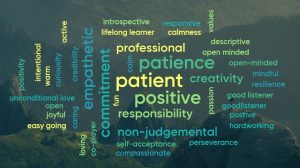6.2 Reflective Practice in the Workplace

“It’s on the strength of observation and reflection that one finds a way, so we must dig and delve unceasingly.” Charles Monet
“Why reflective practice is necessary for an early educator is not as much of a debate today, but even more important is the necessity to make space and time to think deeply about our why?” Roffey-Barentson & Malthouse (2009, p. 16) introduces ten useful ‘benefits of reflective practice’ which address the nature of disposition and reflective practice, as well as the personal and professional benefits of reflection. These ten benefits highlight the need to integrate our thinking and incorporate our values and beliefs. By recognizing this, we may be more inclined to establish a day to day practice of reflection.
- Improving our own practice; if one takes time to reflect on the different parts of their work, it is bound to lead to improvement.
- Learning from reflective practice; there is good evidence that purposeful reflection helps ‘deep’ learning take place, and this helps make connections between different aspects of your work.
- Enhances problem solving skills; by carefully and honestly considering problems, and multiple perspective solutions can be found.
- Becoming a critical thinker; Critical thinking is about ‘thinking well’ and reflective practice allows one to adjust what they think to take account of changes in circumstances. Are our assumptions correct?
- Making Decisions; as you reflect on your practice, you will find you need to make decisions about what to do (or not to do) next.
- Improving your own organizational skills; If one is thinking carefully about what they are doing, identifying possible actions and choices, trying out solutions, and adjusting what to do involves a great deal of organization.
- Managing personal change; if you are using the techniques of reflective practice, which involves, calm, thoughtful, honest, critical and organized thinking and action, this should introduce a calming and less emotional response to that change.
- Acknowledging personal values; there will be things which take place within a professional situation as an educator which will bump up one’s own personal values such as what you believe in, and what you think is wrong or right.
- Taking your own advice; workers are often more critical of their own work than anyone else.
- Recognizing emancipatory benefits; if as a worker one reflects on the nine benefits of reflective practice which have so far been described; this is a model of practice which represents the educator as someone with influence over their own practice This is what is at the heart of reflective practice (Third,2015).
Activity: Reflective Practice in Work Integrated Learning
Now view the Reflective Practice in Work Integrated Learning module by Niagara College below which examines reflection from a workplace integrated learning lens OR (WIL). Watch and complete the activities.
Sources
Monet, C. (n.d.). https://www.goodreads.com/quotes/23758-it-s-on-the-strength-of-observation-and-reflection-that-one.
Roffey-Barentsen, J., & Malthouse, R. (2009). Reflective Practice in the Lifelong Learning Sector. Exeter England: Learning Matters.
Third, S. (2015). The effects of regular reflective writing on early childhood educators effectiveness in the workplace [Unpublished paper] Masters of Arts – Integrated Studies, Athabasca University, p.16.

